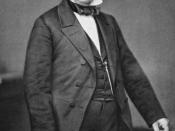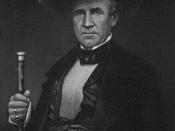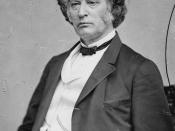During the twenty years before the Civil War much happened in the United States. Each political, social, or economic happening had its own part in causing the Civil War. One of the bloodiest events was something termed "Bleeding Kansas,"ÃÂ which was caused by the inception of the Kansas-Nebraska Act into United States Law. The Act was introduced to Congress by Stephen A. Douglas in an attempt to establish the Kansas and Nebraska territories.
The Kansas-Nebraska Bill caused territorial problems that destroyed the National Party system. It was introduced by Stephen A. Douglas, one of the leading men behind the Compromise of 1850, and in opposition to sectional quarreling. The bill was to establish the Kansas and Nebraska territories. He wanted to send an transcontinental railroad into the area to help increase the economic activity in his home state of Illinois and encourage settlement of the Great Plains area. Since no Company would build a railroad until the area had been organized, Douglas introduced the bill.
The Kansas-Nebraska Bill showed a fallacy in the Compromise of 1850's ideal of popular sovereignty. Popular sovereignty had given each territory the right to chose whether or not it would allow slavery. The problem was that Kansas and Nebraska lay within the land acquired under the Louisiana Purchase. Under the Missouri Compromise, slavery had been forbidden in all territories in the Louisiana purchase- from latitude 36ÃÂð30' north to the order with Canada. Southern politicians demanded that the 36ÃÂð30' law be removed. With a slight notion of the consequences of such an action, Douglas included it in is bill, which was passed in May of 1854.
The Kansas-Nebraska Act caused much more trouble than either Douglas or the southern politicians had anticipated. First was trouble with the Fugitive Slave Act. The Free- Soilers and other...


